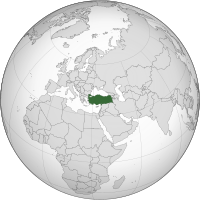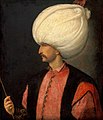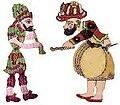
Back Portaal:Turkye Afrikaans بوابة:تركيا Arabic Portal:Türkiyə Azerbaijani پوْرتال:تورکیه AZB Портал:Турция Bulgarian প্রবেশদ্বার:তুরস্ক Bengali/Bangla Portal:Turska BS دەروازە:تورکیا CKB Portal:Türkei German Portal:Tırkiya DIQ
Merhaba! Türkiye portalına hoş geldiniz. Hi! Welcome to the Turkey portal.
 | |

| |
Turkey, officially the Republic of Türkiye, is a country mainly in Anatolia in West Asia, with a smaller part called East Thrace in Southeast Europe. It borders the Black Sea to the north; Georgia, Armenia, Azerbaijan, and Iran to the east; Iraq, Syria, and the Mediterranean Sea (and Cyprus) to the south; and the Aegean Sea, Greece, and Bulgaria to the west. Turkey is home to over 85 million people; most are ethnic Turks, while ethnic Kurds are the largest ethnic minority. Officially a secular state, Turkey has a Muslim-majority population. Ankara is Turkey's capital and second-largest city. Istanbul is its largest city, and its economic and financial center, as well as the largest city in Europe. Other major cities include İzmir, Bursa and Antalya.
Human habitation began in the Late Paleolithic. Home to important Neolithic sites like Göbekli Tepe and some of the earliest farming areas, present-day Turkey was inhabited by various ancient peoples. Hattians were assimilated by the Anatolian peoples. Classical Anatolia transitioned into cultural Hellenization following the conquests of Alexander the Great; Hellenization continued during the Roman and Byzantine eras. The Seljuk Turks began migrating into Anatolia in the 11th century, starting the Turkification process. The Seljuk Sultanate of Rum ruled Anatolia until the Mongol invasion in 1243, when it disintegrated into Turkish principalities. Beginning in 1299, the Ottomans united the principalities and expanded; Mehmed II conquered Istanbul in 1453. During the reigns of Selim I and Suleiman the Magnificent, the Ottoman Empire became a global power. From 1789 onwards, the empire saw major transformation, reforms, and centralization while its territory declined.
In the 19th and early 20th centuries, persecution of Muslims during the Ottoman contraction and in the Russian Empire resulted in large-scale loss of life and mass migration into modern-day Turkey from the Balkans, Caucasus, and Crimea. Under the control of the Three Pashas, the Ottoman Empire entered World War I in 1914, during which the Ottoman government committed genocides against its Armenian, Greek and Assyrian subjects. Following Ottoman defeat, the Turkish War of Independence resulted in the abolition of the sultanate and the signing of the Treaty of Lausanne. The Republic was proclaimed on 29 October 1923, modelled on the reforms initiated by the country's first president, Mustafa Kemal Atatürk. Turkey remained neutral during most of World War II, but was involved in the Korean War. Coups in 1960 and 1980 interrupted the transition to a multi-party system.
Turkey is an upper-middle-income and emerging country; its economy is the world's 18th-largest by nominal and 11th-largest by PPP-adjusted GDP. It is a unitary presidential republic. Turkey is a founding member of the OECD, G20, and Organization of Turkic States. With a geopolitically significant location, Turkey is a regional power and an early member of NATO. An EU-candidate, Turkey is part of the EU Customs Union, CoE, OIC, and TURKSOY.
Turkey has coastal plains, a high central plateau, and various mountain ranges; its climate is temperate with harsher conditions in the interior. Home to three biodiversity hotspots, Turkey is prone to frequent earthquakes and is highly vulnerable to climate change. Turkey has universal healthcare, growing access to education, and increasing innovativeness. It is a leading TV content exporter. With 21 UNESCO World Heritage sites, 30 UNESCO intangible cultural heritage inscriptions, and a rich and diverse cuisine, Turkey is the fourth most visited country in the world. (Full article...)
Selected article -
Anatolia (Turkish: Anadolu), also known as Asia Minor, is a large peninsula or a region in Turkey, constituting most of its contemporary territory. Geographically, the Anatolian region is bounded by the Mediterranean Sea to the south, the Aegean Sea to the west, the Turkish Straits to the north-west, and the Black Sea to the north. The eastern and southeastern boundary is either the southeastern and eastern borders of Turkey, or an imprecise line from the Black Sea to Gulf of Iskenderun. Topographically, the Sea of Marmara connects the Black Sea with the Aegean Sea through the Bosporus strait and the Dardanelles strait, and separates Anatolia from Thrace in the Balkan peninsula of Southeastern Europe.
The ancient Anatolian peoples spoke the now-extinct Anatolian languages of the Indo-European language family, which were largely replaced by the Greek language during classical antiquity as well as during the Hellenistic, Roman, and Byzantine periods. The major Anatolian languages included Hittite, Luwian, and Lydian, while other, poorly attested local languages included Phrygian and Mysian. Hurro-Urartian languages were spoken in the southeastern kingdom of Mitanni, while Galatian, a Celtic language, was spoken in Galatia, central Anatolia. Ancient peoples in the region included Galatians, Hurrians, Assyrians, Hattians, Cimmerians, as well as Ionian, Dorian, and Aeolic Greeks. The Turkification of Anatolia began under the rule of the Seljuk Empire in the late 11th century, continued under the Ottoman Empire between the late 13th and early 20th centuries, and continues today under the Republic of Turkey. However, various non-Turkic languages continue to be spoken by minorities in Anatolia, including Kurdish, Neo-Aramaic, Armenian, North Caucasian languages, Laz, Georgian, and Greek. (Full article...)General images
Did you know -
- ... that Kieran Prendergast was the British Ambassador to Turkey before serving as United Nations Under-Secretary-General for Political Affairs? (June 21, 2008) Wikipedia:Recent additions 220
- ... that as many as 150 people a year attempt to commit suicide by jumping from either the Bosporus Bridge or Fatih Sultan Mehmet Bridge in Turkey? (September 6, 2004) Wikipedia:Recent additions 14
- ... that the modern border between Iran and Iraq dates back to the Treaty of Zuhab, which concluded the Ottoman–Safavid War of 1623–1639? (November 29, 2008) Wikipedia:Recent additions 235
- ... that the construction of the Deliktaş Tunnel, Turkey's longest railway tunnel, lasted almost four decades? (April 18, 2014)
- ... that Sultanahmet Jail in Istanbul, Turkey, which served mostly as a prison reserved for intellectual dissidents, is today a five-star hotel? (March 6, 2008)Wikipedia:Recent additions 210
- ... that when Turkey gave out personal identification numbers to their citizens in 2000, they chose to number all 120 million people born since 1840, living or dead? (November 11, 2009) Wikipedia:Recent additions 250
- ... that the ticket lottery site for the December 2007 Ahmet Ertegün Tribute Concert featuring Led Zeppelin, crashed due to over a billion page views of fans seeking to purchase the 20,000 tickets on sale? (January 8, 2008) Wikipedia:Recent additions 198
Selected picture
Selected biography -
Burak Yılmaz (born 15 July 1985) is a Turkish professional football coach and former player who played as a forward. He is the current head coach of Süper Lig club Kayserispor.
Yılmaz is one of nine players to play for each of the Big Three clubs of Istanbul, and one of only two players who have played for these three clubs as well as Trabzonspor along with Sergen Yalçın. (Full article...)Selected video -
Selected quote -
| “ | Heroes who shed their blood and lost their lives! You are now lying in the soil of a friendly country. Therefore rest in peace. There is no difference between the Johnnies and Mehmets to us where they lie side by side here in this country of ours. You, the mothers, who sent their sons from far away countries wipe away your tears; your sons are now lying in our bosom and are in peace. After having lost their lives on this land they have become our sons as well. | ” |
Recognized content
Provinces
Related portals
Religions in Turkey
Neighbouring countries
Countries with related heritage
WikiProjects
Turkish wikipedia
 |
There is a Turkish version of Wikipedia, the free encyclopedia. |
Wikimedia
The following Wikimedia Foundation sister projects provide more on this subject:
-
Commons
Free media repository -
Wikibooks
Free textbooks and manuals -
Wikidata
Free knowledge base -
Wikinews
Free-content news -
Wikiquote
Collection of quotations -
Wikisource
Free-content library -
Wikiversity
Free learning tools -
Wikivoyage
Free travel guide -
Wiktionary
Dictionary and thesaurus
© MMXXIII Rich X Search. We shall prevail. All rights reserved. Rich X Search














































































































